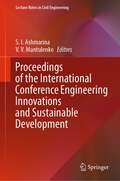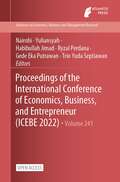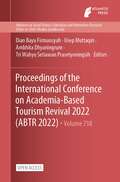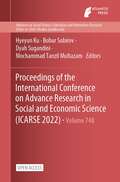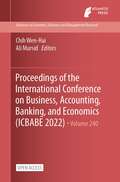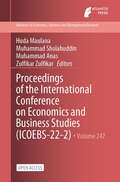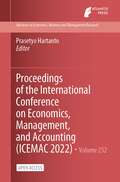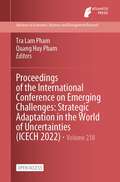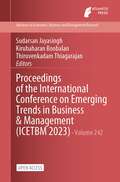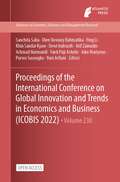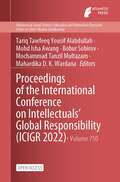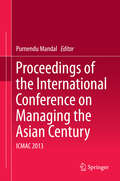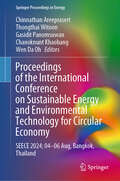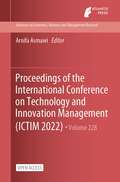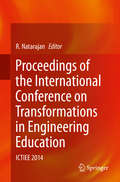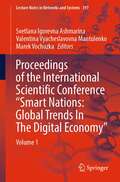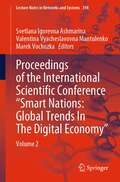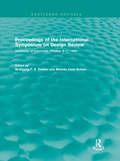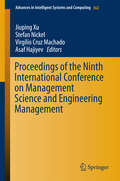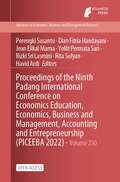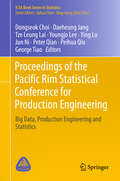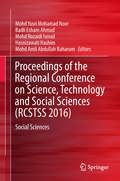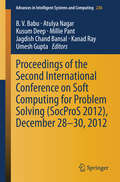- Table View
- List View
Proceedings of the International Conference Engineering Innovations and Sustainable Development (Lecture Notes in Civil Engineering #210)
by S. I. Ashmarina V. V. MantulenkoThis book contains contributions from the international conference “Engineering Innovations and Sustainable Development,” organized by three Russian universities on June 17–18, 2021. By presenting international research on various sustainability issues, it includes topics such as current trends in industrial and agricultural development, innovations in the construction and transport sectors, problems concerning the financing of innovative activities and governmental support for innovations, and engineering competences and skills in the era of new technologies. It also covers the economic, environmental, and informational aspects of sustainable development in the context of innovations. Finally, the book addresses theoretical and practical aspects by studying the phenomenon of sustainability and engineering development in terms of comparing international experiences. It provides significant value for scientists, teachers, and students of higher educational institutions, and specialists, who are researching sustainable development issues in the era of engineering innovations.
Proceedings of the International Conference of Economics, Business, and Entrepreneur (Advances in Economics, Business and Management Research #241)
by Nairobi Yuliansyah Habibullah Jimad Ryzal Perdana Gede Eka Putrawan Trio Yuda SeptiawanThis is an open access book.The Faculty of Economics and Business of Universitas Lampung in Indonesia is hosting the International Conference of Economics, Business & Entrepreneurship (ICEBE) 2022, its fifth annual international conference. The goal of this conference is to provide a clear direction and substantial advancements in the quickly recovering global economy. The 5th ICEBE welcomes and cordially encourages all authors to submit outstanding works on a range of topics relevant to the conference's theme.Theme: “Global Economy and Business Recovery Growth to Create a Sustainable Business-Friendly Environment”
Proceedings of the International Conference on Academia-Based Tourism Revival 2022 (Advances in Social Science, Education and Humanities Research #738)
by Dian Bayu Firmansyah Usep Muttaqin Ambhita Dhyaningrum Tri Wahyu Setiawan PrasetyoningsihThis is an open access book. ABTR 2022 is the first international conference on Academia-Based Tourism Revival initiated to generate a sort of a hybrid method proposed and tested in relation to the tourism revival process in Indonesia, especially in Banyumas, Central Java following the covid-19. This conference aims to generate collective ideas of researchers, practitioners and policy makers on the sound and strategic solutions to reinvent and revive the tourism sector in the post Covid-19 era in Banyumas, Central Java, Indonesia. This international conference is supported by experts from various universities: Mae Fah Luang University (Thailand), Lomonosov Moscow State University (Rusia), Universiti Kebangsaan Malaysia (Malaysia), Mariano Marcos State University (Philipines), Jamal Mohamed College (India). These universities have confirmed to send their delegations to participate in this conference as presenters.
Proceedings of the International Conference on Advance Research in Social and Economic Science (Advances in Social Science, Education and Humanities Research #748)
by Hyeyun Ku Bobur Sobirov Dyah Sugandini Mochammad Tanzil MultazamThis is an open access book.ThemeOptimizing the use of social science and economics in the post-pandemic revival eraThe Covid-19 pandemic is slowly starting to be overcome. Contributions from various disciplines are also needed in the context of post-pandemic recovery, including the fields of social science and economics. Thus, the International Conference on Advanced Research in Social and Economic Science is a forum for researchers and practitioners to exchange ideas and advances on how emerging research methods and sources are applied to various fields of the social sciences, as well as discuss current and future challenges. Join the social sciences conference as we explore the latest trends in social sciences and discuss common challenges in politics, social, communication, humanities, networking society, business, sustainable development, and international relations.
Proceedings of the International Conference on Business, Accounting, Banking, and Economics (Advances in Economics, Business and Management Research #240)
by Chih Wen-Hai Ali MursidThis is an open access book.Due to the impacts of the Coronavirus Disease (COVID-19) around the world, international conference will be held in Semarang, Central Java, Indonesia, on 9th November 2022. Will take place online via zoom. The BABE International Conference series is held at regular intervals to provide an interactive forum for presentation and discussion on the International Conference of Business, Accounting, Banking, and Economics Research. We welcome participants academicians and practitioners from all over the world who are interested in developing new knowledge and professional ties to enhance career opportunities. The BABE international conference should serve as an ideal forum to establish relationships among members around the world. We hope you will join us at the BABE international conference 2022 which will be held regularly every year.
Proceedings of the International Conference on Economics and Business Studies (Advances in Economics, Business and Management Research #247)
by Huda Maulana Muhammad Sholahuddin Muhammad Anas Zulfikar ZulfikarThis is an open access book.Universitas Muhammadiyah Surakarta proudly invite all students, researchers and academia to participate in the International Conference on Economics and Business Studies (ICOEBS).This conference is a part of a conference program called International Summit on Science Technology and Humanity (ISETH) 2022 Organized by Universitas Muhammadiyah Surakarta and will be held on 5-6 December 2022. This year's conference's theme is Green Business in Emerging Economies; Current Issues and Future Challenges.ICOEBS aims to provide opportunities for students, scholars and practitioners to present original research articles, unpublished research and novelties in Economics and Business studies. Full paper submission deadline is 8 November 2022.
Proceedings of the International Conference on Economics, Management, and Accounting (Advances in Economics, Business and Management Research #252)
by Prasetyo HartantoThis is an open access book.The International Conference on Economics, Management, and Accounting (ICEMAC) is an activity held at an international conference by presenting new studies and research results in the fields of Economics, Management, and Accounting. The Management and Accounting Study Program is the organizer of this international conference. ICEMAC is the third conference held by us and will be held virtually due to the COVID-19 Pandemic which has not shown a better situation. The 3rd ICEMAC 2022 conference will be expected to bring together national and international scale researchers, practitioners, students, and community and industry activists in our chosen fields. Considering the occurrence of disruptive technology in Indonesia which has an impact on business transformation in various fields, especially the accounting and economic fields which have changed massively into digitalization and put forward a new equilibrium or new balance. In order to move into the 5.0 era, the 3rd ICEMAC 2022 international conference has the main theme, namely“Sustainable business strategy to face challenges & Opportunity in digitalization era”.
Proceedings of the International Conference on Education, Humanities, and Management (Advances in Social Science, Education and Humanities Research #741)
by Yaoping Liu Saichol ChujuarjeenThis is an open access book. This event is co-organized by the Institute of Science Innovation and Culture (ISIC) and Research and Development Institute (RDI), Rajamangala University of Technology Krungthep, Thailand. This year’s ICEHUM 2022 was held online and onsite on 26 November 2022. The theme of this conference is “Leading and Being Sustainable in the COVID-19 New Normal“. This conference aspires to bring to light new standards, models, and reference guides that will help humanity rise above the challenges of COVID-19, leading men and women to embrace the new normal, no longer uncertain but living a sustainable existence.
Proceedings of the International Conference on Emerging Challenges: Strategic Adaptation in the World of Uncertainties (Advances in Economics, Business and Management Research #238)
by Tra Lam Pham Quang Huy PhamThis is an open access book.University of Economics Ho Chi Minh City, Hanoi University of Science and Technology – School of Economics and Management, University of Economics and Business - Vietnam National University, Hanoi, National Economics University – Faculty of Business and Management, The University of Danang – University of Economics, Vietnam National University – International School, Foreign Trade University, University of Hertfordshire (UK), AVSE Global (France) and PPM School of Management (Indonesia) will organize The 10th International Conference on Emerging Challenges: Strategic Adaptation in the World of Uncertainties (SAWU) in Ho Chi Minh City, Vietnam (online sessions available for international participants) on November 4-5, 2022. We would like to invite you to be a part of the ICECH2022 and submit your research papers for presentation consideration.The aim of ICECH2022 is to provide a forum for academics and professionals to share research findings, experiences and knowledge for adaptation and business strategy in a post-Covid as well as various uncertainties and complexities in the world in the Asia-Pacific region. We welcome the submissions in Economics, Business, Innovation Management, and Business Law.Authors of accepted papers will be invited to present their work at the Conference. In addition, authors of best papers will also be invited to submit their papers to a special issue or a regular issue for publication consideration in selected journals. These papers will also be under an official double-blind peer-reviewed process by the journal.
Proceedings of the International Conference on Emerging Trends in Business & Management (Advances in Economics, Business and Management Research #242)
by Sudarsan Jayasingh Kirubaharan Boobalan Thiruvenkadam ThiagarajanThis is an open access book.The International Conference on Emerging Trends in Business & Management (ICETBM2023) aims to bring together leading academicians, practitioners, researchers, and students to exchange their views, knowledge, experience and insights on the emerging trends in business and management. The conference theme for year 2023 is “Business Intelligence and Analytics as Drivers for Digital Transformation”. Organizations are adopting a data-driven approach to identify new business opportunities, serve customers better, increase sales, improve the efficiency of operations and more. The amount of data generated, captured, copied, and consumed worldwide is growing rapidly due to increased use of the internet, mobile phone and social media. In today’s modern corporate environment, business intelligence and analytics have emerged as indispensable tools for improving decision-making, facilitating the execution of major initiatives, and guiding the overall company strategies. Business Intelligence and Analytics enables organizations to develop new innovative business models and approaches in the era of digital transformation. The role of analytics in solving business problems has increased manifold in recent years. Researchers, academics, and practitioners are paying more attention because of the increasing benefits achieved using business analytics.The conference will be held in SSN School of Management, Sri Sivasubramaniya Nadar College of Engineering, Kalavakkam, Chennai, India on 24th & 25th February 2023 and will be a hybrid event. This conference will offer invited talks by experts and paper presentations from leading academicians and industry speakers to share new ideas, research insights, recent innovations, trends, and challenges faced in the field of Business and Management.
Proceedings of the International Conference on Global Innovation and Trends in Economics and Business (Advances in Economics, Business and Management Research #667)
by Ying Li Achmad Nurmandi Sanchita Saha Dien Noviany Rahmatika Khin Sandar Kyaw Dewi Indriasih Arif Zainudin Yanti Puji Astutie Joko Mariyono Purwo Susongko Yuni ArfianiThis is an open access book.The conferences aims to support research and development in the field of Global Innovation and Trends in Economics and Business. Another purpose is to improve scientific information exchange among researchers, developers, students, and practitioners. Every year, the conference will be organised to provide an excellent platform for individuals to discuss their perspectives and experiences in the fields of Global Innovation and Trends in Economics and Business, as well as related fields.
Proceedings of the International Conference on Intellectuals’ Global Responsibility (Advances in Social Science, Education and Humanities Research #750)
by Tariq Tawfeeq Yousif Alabdullah Mohd Isha Awang Bobur Sobirov Mochammad Tanzil Multazam Mahardika D. K. WardanaThis is an open access book. The Covid-19 pandemic has become a global issue have a great impact in almost all fields including in the economic, social, political, cultural and education, and has created social pressures community economy. Almost all over the country having trouble. However, this has consequences for declining economic growth has had an impact on social life, including in countries in ASEAN and especially in Indonesia. We are only at the beginning of the most challenging part, which is how we will emerge out of this situation and return to a “new normal. These challenges highlight the importance of science, technology, and innovation as the decisive factors in any scenario of emergence from the crisis and economic recovery.To eliminate Covid-19 and find solutions to its effects are endeavored through research in various fields of sciences. Hopefully, the cure can be found and the new situation can be adapted.
Proceedings of the International Conference on Managing the Asian Century
by Purnendu MandalThis volume presents the refereed papers given at the International Conference on Managing the Asian Century, held in Singapore in July 2013. The proceedings of this conference include original papers contributed by researchers from many countries on different continents. The papers cover multi-disciplinary areas such as management, the social sciences, development economics, banking & finance, engineering management, and education, all in connection with the development of countries in Asia. Further, the papers are based on the 9 tracks at the conference: Transnational Education Antecedents of Asia's Competitiveness Emerging Trends in Banking, Finance and Accounting Business and Revenue Models in the Gaming Industry Psychological Issues in Asia Emerging Retail and Service Industries Entrepreneurship, Creativity and Innovation Systems Thinking and Systems Practices Tourism Initiatives, Relationships and Issues in the Asia-Pacific Region
Proceedings of the International Conference on Sustainable Energy and Environmental Technology for Circular Economy: SEECE 2024; 04–06 Aug, Bangkok, Thailand (Springer Proceedings in Energy)
by Chinnathan Areeprasert Thongthai Witoon Gasidit Panomsuwan Chanoknunt Khaobang Wen Da OhThis book includes peer reviewed articles from the International Conference on Sustainable Energy and Environmental Technology for Circular Economy (SEECE 2024) held from 04th to 06th August in Bangkok, Thailand. It presents recent advances in sustainable energy and environmental technology for circular economy. Topics include but not limited to are: Renewable energy, biomass conversion, materials for energy and environment, energy efficiency, optimization and AI in energy, energy management, policy and economics, and green manufacturing. It provides a platform for professionals and researchers to exchange ideas on these important topics and foster future collaboration.
Proceedings of the International Conference on Technology and Innovation Management (Advances in Economics, Business and Management Research #665)
by Arnifa AsmawiThis is an open access book.The Centre for Knowledge and Innovation Management (CEKIM), Faculty of Management, Multimedia University is set to hold its second conference titled `International Conference on Technology and Innovation Management 2022 (ICTIM 2022)’ which carries the theme `Humanizing Innovation for Sustainability’. This conference will bring together academic researchers, industry players, policymakers and civil society leaders to engage and share the latest trends and development in technology and innovation management.
Proceedings of the International Conference on Transformations in Engineering Education
by R. NatarajanThis book comprises the proceedings of the International Conference on Transformations in Engineering Education conducted jointly by BVB College of Engineering & Technology, Hubli, India and Indo US Collaboration for Engineering Education (IUCEE). This event is done in collaboration with International Federation of Engineering Education Societies (IFEES), American Society for Engineering Education (ASEE) and Global Engineering Deans' Council (GEDC). The conference is about showcasing the transformational practices in Engineering Education space.
Proceedings of the International Scientific Conference “Smart Nations: Volume 1 (Lecture Notes in Networks and Systems #397)
by Marek Vochozka Svetlana Igorevna Ashmarina Valentina Vyacheslavovna MantulenkoThis book contains contributions from an international scientific conference, “Smart Nations: Global Trends In The Digital Economy”, which was organized by the State University of Management (Moscow). By presenting international research on the issues of the Smart Nations concept, this book includes topics such as state and legal aspects of digital transformation of management systems, new technologies in the digital environment of the information society and smart economy as a new reality. The conference proceedings cover legal, informational, technological and other aspects of socio-economic development in the context of digital innovations. This work addresses theoretical and practical aspects by studying the phenomenon of Smart Nations that requires understanding the modern information technologies, big data analysis, distributed registry management, new microprocessor technologies and broadband data transmission technologies in terms of their usefulness and accessibility to any representative of humanity.
Proceedings of the International Scientific Conference “Smart Nations: Volume 2 (Lecture Notes in Networks and Systems #398)
by Marek Vochozka Svetlana Igorevna Ashmarina Valentina Vyacheslavovna MantulenkoThis book contains contributions from an international scientific conference, “Smart Nations: Global Trends In The Digital Economy”, which was organized by the State University of Management (Moscow). By presenting international research on the issues of the Smart Nations concept, this book includes topics such as smart business in a "smart city", digital marketing systems and Smart Nations phenomenon: social and business aspects. The conference proceedings cover legal, informational, technological and other aspects of socio-economic development in the context of digital innovations. This work provides significant value for scientists, teachers and students of higher educational institutions and specialists, who are researching socio-economic development issues in the era of smart technologies.
Proceedings of the International Symposium on Design Review: University of Cincinnati, October 8-11, 1992 (Routledge Revivals)
by Wolfgang F.E. Preiser Brenda Case ScheerFirst published in 1992, this book collects together the papers presented at the International Symposium on Design Review which was held to address the growing tendency of local governments to institute programs of aesthetic control. The editor argues that the widespread adoption of design review processes in the years preceding the conference necessitated thoroughgoing professional criticism and a number of areas of debate are identified and addressed in the subsequent papers. Are the difficulties experienced by planners, community activists and architects with the process due to its relative youth or inherent flaws in the entire concept? How should mechanical problems like time and expense, the ease with which the process can be manipulated, and general inefficiencies in the system be resolved? More intricate problems are also addressed, such as: who has the power to judge the aesthetic quality of a building, whether design review infringes on the rights of the individual especially under the First Amendment, whether the design review process is "fair", and the difficulty for the reviewer of deciding what is right and what is wrong having taken into account factors that can be highly subjective or contradict more practical concerns.
Proceedings of the Ninth International Conference on Management Science and Engineering Management
by Jiuping Xu Stefan Nickel Virgilio Cruz Machado Asaf HajiyevThis is the Proceedings of the Ninth International Conference on Management Science and Engineering Management (ICMSEM) held from July 21-23, 2015 at Karlsruhe, Germany. The goals of the conference are to foster international research collaborations in Management Science and Engineering Management as well as to provide a forum to present current findings. These proceedings cover various areas in management science and engineering management. It focuses on the identification of management science problems in engineering and innovatively using management theory and methods to solve engineering problems effectively. It also establishes a new management theory and methods based on experience of new management issues in engineering. Readers interested in the fields of management science and engineering management will benefit from the latest cutting-edge innovations and research advances presented in these proceedings and will find new ideas and research directions. A total number of 132 papers from 15 countries are selected for the proceedings by the conference scientific committee through rigorous referee review. The selected papers in the first volume are focused on Intelligent System and Management Science covering areas of Intelligent Systems, Logistics Engineering, Information Technology and Risk Management. The selected papers in the second volume are focused on Computing and Engineering Management covering areas of Computing Methodology, Project Management, Industrial Engineering and Decision Making Systems.
Proceedings of the Ninth Padang International Conference on Economics Education, Economics, Business and Management, Accounting and Entrepreneurship (Advances in Economics, Business and Management Research #672)
by Perengki Susanto Dian Fitria Handayani Jean Elikal Marna Yollit Permata Sari Rizki Sri Lasmini Rita Sofyan Havid ArdiThis is an open access book.This conference is aimed to provide a medium for participants in disseminating their research ideas and results as well as developing their networks. Through the participants’ contribution, it is hoped that this conference could provide a deeper understanding of Economics Education, Economics, Business and Management, Accounting and Entrepreneurship issues.The theme for The Ninth Padang International Conference on Economics Education, Economics, Business and Management, Accounting and Entrepreneurship (PICEEBA) is “Leap to the imminent future: Seizing Opportunities in Education, Economics, and Business”. In this conference, we invite experts, practitioners and observers from all around the globe the to sit together to explore various issues and debates on economics education, economics, bussines and management, accounting, and entrepreneurship.The conference will be held online on May 21st, 2022 via Zoom Meeting and "UNP Video Streaming" Youtube Channel. We welcome empirical or conceptual contributions by any method or approach, especially those relevant to the issues of Education in Economics, Economics, Business and Management, Accounting and Entrepreneurship
Proceedings of the Pacific Rim Statistical Conference for Production Engineering: Big Data, Production Engineering And Statistics (ICSA Book Series in Statistics)
by Dongseok Choi Daeheung Jang Tze Leung Lai Youngjo Lee Ying Lu Jun Ni Peter Qian Peihua Qiu George TiaoThis book presents the proceedings of the 2nd Pacific Rim Statistical Conference for Production Engineering: Production Engineering, Big Data and Statistics, which took place at Seoul National University in Seoul, Korea in December, 2016. The papers included discuss a wide range of statistical challenges, methods and applications for big data in production engineering, and introduce recent advances in relevant statistical methods.
Proceedings of the Regional Conference on Science, Technology and Social Sciences: Social Sciences (RCSTSS #2016)
by Mohd Yusri Mohamad Noor Badli Esham Ahmad Mohd Rozaidi Ismail Hasnizawati Hashim Mohd Amli Abdullah BaharumThis book features papers addressing a broad range of topics including psychology, religious studies, natural heritage, accounting, business, communication, education and sustainable development. It serves as a platform for disseminating research findings by academicians of local, regional and global prominence, and acts as a catalyst to inspire positive innovations in the development of the region. It is also a significant point of reference for academicians and students. This collection of selected social sciences papers is based on the theme “Soaring Towards Research Excellence”, presented at the Regional Conference of Sciences, Technology and Social Sciences (RCSTSS 2016), organised bi-annually by Universiti Teknologi MARA Cawangan Pahang, Malaysia.
Proceedings of the Second International Conference on Soft Computing for Problem Solving (SocProS 2012), December 28-30, 2012
by B. V. Babu Atulya Nagar Kusum Deep Millie Pant Jagdish Chand Bansal Kanad Ray Umesh GuptaThe present book is based on the research papers presented in the International Conference on Soft Computing for Problem Solving (SocProS 2012), held at JK Lakshmipat University, Jaipur, India. This book provides the latest developments in the area of soft computing and covers a variety of topics, including mathematical modeling, image processing, optimization, swarm intelligence, evolutionary algorithms, fuzzy logic, neural networks, forecasting, data mining, etc. The objective of the book is to familiarize the reader with the latest scientific developments that are taking place in various fields and the latest sophisticated problem solving tools that are being developed to deal with the complex and intricate problems that are otherwise difficult to solve by the usual and traditional methods. The book is directed to the researchers and scientists engaged in various fields of Science and Technology.
Proceedings of the Second International Conference on the Future of ASEAN (ICoFA) 2017 – Volume 2: Science And Technology
by Mohd Azwan Abbas Rizauddin SaianThis book examines how business, the social sciences, science and technology will impact the future of ASEAN. Following the ASEAN VISION 2020, it analyses the issues faced by ASEAN countries, which are diverse, while also positioning ASEAN as a competitive entity through partnerships. On the 30th anniversary of ASEAN, all ASEAN leaders agreed to the establishment of the ASEAN VISION 2020, which delineates the formation of a peaceful, stable and dynamically developed region while maintaining a community of caring societies in Malaysia, Indonesia, Singapore, Brunei, Vietnam, Thailand, the Philippines, Myanmar, Laos and Cambodia. In keeping with this aspiration, Universiti Teknologi MARA Perlis took the initial steps to organise conferences and activities that highlight the role of the ASEAN region. The Second International Conference on the Future of ASEAN (ICoFA) 2017 was organised by the Office of Academic Affairs, Universiti Teknologi MARA Perlis, to promote more comprehensive integration among ASEAN members. This book, divided into two volumes, offers a useful guide for all those engaged in research on business, the social sciences, science and technology. It will also benefit researchers worldwide who want to gain more knowledge about ASEAN countries
